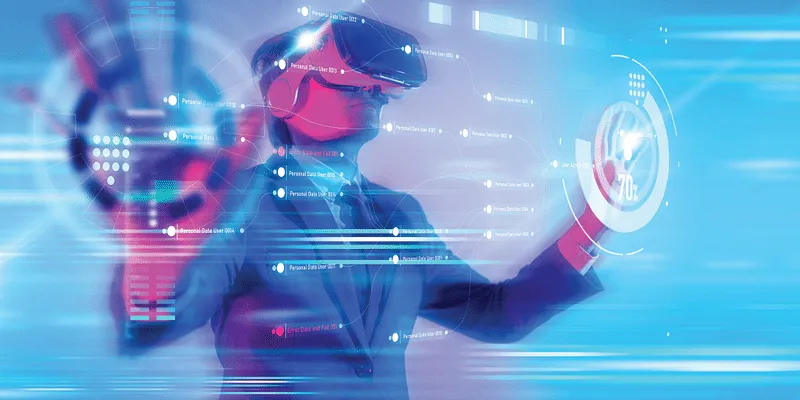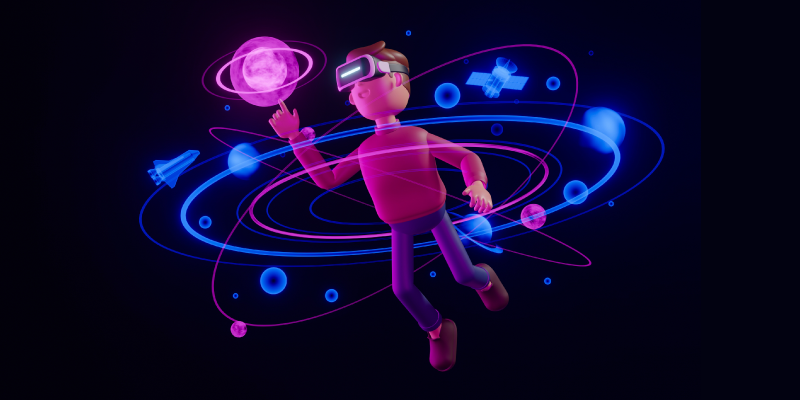Metaverse revolution: Shaping the digital tomorrow
The tech world was abuzz with the transformation of Facebook to ‘Meta’ in October 2021. According to Bloomberg Intelligence, the global metaverse revenue is anticipated to surge, with projections believed to make a turnover of US$800 billion by 2024. So, what is this Metaverse? How does it function?
Being weary of all the urban cacophony, the urbanite retired for the day and escaped into the world of dreams. The world there is vibrant, colourful and completely antithetical to the monochromatic reality. Alas, his dream crumbled into the harsh realities of life and he had to wake up. Oh, only if he could dwell in that alternate reality forever!
If we say, he can? The ever-evolving world of technology can make the impossible highly possible. With regard to that, the tech world was abuzz with the transformation of Facebook to ‘Meta’ in October 2021. According to insights from Bloomberg Intelligence, the global metaverse revenue is anticipated to surge, with projections believed to make a turnover of US$800 billion by 2024. Indeed; a piece of virtual pie yet has kept all the behemoths competing over it!
So, what is this Metaverse? How does it function? How can it redefine our digital experience? Surely, these questions are popping into your head. Rest assured, as we’ve narrowed down everything that you need to know about Metaverse in this article. Read on to know more!

What is the Metaverse?
The emerging nascent technology, Metaverse or “the next Internet”, is perceived to be the next big thing on the Internet. Although it hasn’t developed to be a single entity, the metaverse is a collective virtual realm generated by the digital and virtually augmented physical realm. Simply put, Metaverse may be referred to as myriads of enhanced virtual environments.
Being a combinative innovation, Metaverse needs a range of trends and technologies like augmented reality (AR), the Internet of Things (IoT), Head-Mounted Displays (HMDs), virtual reality (VR), artificial intelligence (AI), and others to operate. It is supported by non-fungible tokens (NFTs) and digital money. The next version of the Internet or "iteration" known as Web 3.0, is closely related to the metaverse in many aspects.
Nonetheless, the existing version of Metaverse is both theoretical and usable; for instance, you can buy a VR headset, create an avatar, and enter the world of virtual reality at this very moment. Its numerous domains or platforms are still mostly segregated and are not yet fully connected.
However, it is noteworthy to mention that although this immersive 3D internet is still in process, the coinage of the term ‘metaverse’ dates back to 1992 by the author of Snow Crash, Neal Stephenson.
How does it function?
Considering the fact that Metaverse isn’t fully built, everything is based on a range of scenarios. Still, with regard to the above discussions, the functionality and growth of Metaverse are dependent on-
Virtual Reality (VR)
An artificial 3D environment that allows users to engage with a virtual environment in a way that simulates reality.
Augmented Reality (AR)
A comparatively less immersive environment that uses some sort of lens to apply digital overlays over the real world.
Three potential scenarios of Metaverse were presented by Lauren Lubetsky, senior manager of Bain & Company, at the MIT Platform Strategy Summit in 2022:
- The metaverse is governed by major competing ecosystems, such as Android and Apple meta worlds, with finite interoperability.
- The metaverse is still a domain of specialised applications yet far from being a complete virtual world.
- Being an imitation of the internet in 3D, Metaverse is an open, dynamic and interoperable space.
Elevating the digital experience to new heights, the Metaverse delivers a wide array of real-world functionalities within a three-dimensional realm. Let’s learn more about it!
Applications of Metaverse
Gaming
Gaming has traditionally been at the forefront of virtual experiences, and the Metaverse takes this to a whole new level. It immerses gamers in virtual worlds where socialisation and customisation reach unprecedented levels. Companies are investing significantly in Metaverse technologies, blurring the lines between reality and fantasy.
It has introduced play-to-earn models that allow gamers to sell, purchase, and trade various in-game assets in the form of non-fungible tokens (NFTs).
Beyond the economic opportunities, the Metaverse places a strong emphasis on player autonomy and ownership over their in-game assets and experiences. The concept of avatars navigating vast virtual landscapes holds immense appeal for gamers.
Among the notable players in the metaverse gaming arena is Roblox, which, since its launch in 2006, has attracted nearly 202 million monthly active users. Through its digital avatar platform, players can not only create and release games but also join a vast Roblox user community to explore and enjoy thousands of games together.
Business and marketing
Moving beyond the realms of entertainment and education, the all-encompassing world of Metaverse offers tremendous potential for businesses. Companies can host conferences, establish virtual headquarters, and engage in collaborative workspaces, transcending physical boundaries. This opens up exciting possibilities for remote work, global collaboration, and innovative business models. Additionally, the ability to simulate and test ideas in a virtual environment can lead to more efficient and cost-effective product development.
This virtual domain also helps businesses to connect with their audiences in unique ways. For instance, retail brands can create virtual stores where customers can explore and purchase products. You can incorporate features like interactive product demonstrations, virtual try-on experiences, and personalised recommendations.
This not only offers a unique shopping experience but also enables brands to showcase their products in ways that aren't possible in the physical world.
Alongside the world of business, the Metaverse offers numerous benefits to digital advertising. Brands can sponsor virtual events, create branded content within virtual worlds, or even develop their own Metaverse experiences. They can also showcase virtual billboards which offer immersive experiences through ads and marketing initiatives, and create interactions instead of mere ad viewing. Companies can also provide virtual assets or limited-edition items that users can exclusively collect within the Metaverse.
In the context of fashion marketing, brands can introduce a line of products tailored for a specific game within the Metaverse. For instance, during a virtual concert, promote merchandise by allowing Metaverse users to virtually try on items at the concert, take photos with them, and subsequently offer physical versions with discounts.

Healthcare industry
Prominent healthcare brands and hospital chains are increasingly venturing into the virtual realm of the metaverse to enhance patient care.
Market Research Future (MRFR) anticipates that the global healthcare in the metaverse market will surge to an impressive $5,373 million by 2030, exhibiting a remarkable CAGR of 48.3% from 2024 to 2030. Notably, this surge is attributed to the growing influx of patients who have either embraced or are contemplating entering this virtual domain.
The Metaverse serves as a catalyst for Health 4.0, an archetype that seamlessly integrates AR, VR and AI to elevate patient safety outcomes. It helps patients by fostering interactions and providing them with a profound understanding of their health condition.
This will usher in innovative service delivery models, novel services, and revamped payment structures.
Online socialisation
Metaverse allows users to socialise online by providing digital hangouts like dance clubs or coffee shops. Cool, isn’t it?
Challenges that come along
Regardless of the varied benefits of the Metaverse, every technology has its fair share of challenges. As proposed by security expert Ashwin Krishnan, the following factors may be detrimental:
- misapplication of current privacy laws, such as GDPR
- data collection
- data ownership and rights
- exploitation of children, and
- user-to-user privacy.
What lies in store for the metaverse in the future?
As Peter Drucker said- “Trying to predict the future is like trying to drive down a country road at night with no lights, while looking out the back window”; anticipating new trends in technology is like jumping into a dark galaxy. So, even though Metaverse is still in its infancy, it has the potential to arrive with a big bang.
Companies will need to consider how they may leverage this transformative technology to create experiences that are efficient and interesting.












